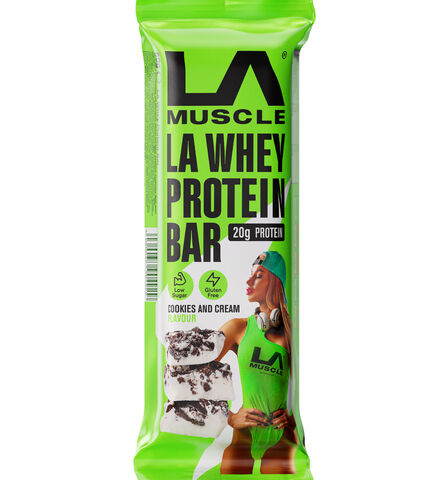Wednesday, 8th January 2025
50 Foods Packed with Fibre
By LA Muscle on 08.01.2025 07:25 pm

1. Chia Seeds
Fibre content: 34.4g per 100g
Tiny but mighty, chia seeds are among the richest sources of fibre. Add them to smoothies, yoghurt, or puddings for a nutrient-packed boost.
2. Flaxseeds
Fibre content: 27.3g per 100g
These seeds are not only a great source of fibre but also provide omega-3 fatty acids, making them a heart-healthy addition to your diet.
3. Split Peas
Fibre content: 25g per 100g (cooked)
Used in soups and stews, split peas are an excellent way to increase your fibre and protein intake simultaneously.
4. Lentils
Fibre content: 15.6g per 100g (cooked)
A versatile legume that works well in soups, salads, or curries.
5. Black Beans
Fibre content: 15g per 100g (cooked)
Known for their creamy texture, black beans are great in burritos, bowls, or even brownies.
6. Chickpeas
Fibre content: 12.5g per 100g (cooked)
Perfect for making hummus or tossing into salads, chickpeas are both delicious and filling.
7. Kidney Beans
Fibre content: 11.3g per 100g (cooked)
A staple in chilli recipes, kidney beans are another fantastic fibre-rich option.
8. Artichokes
Fibre content: 10.3g per medium artichoke
Steam and enjoy with a dipping sauce for a tasty and fibre-filled treat.
9. Avocado
Fibre content: 6.7g per 100g
Creamy and versatile, avocado can be added to toast, salads, or smoothies.
10. Raspberries
Fibre content: 6.5g per 100g
With their sweet and tart flavour, raspberries are a delicious way to boost your fibre intake.
11. Pears
Fibre content: 5.5g per medium pear
A juicy and refreshing snack that’s naturally high in fibre.
12. Apples (with skin)
Fibre content: 4.4g per medium apple
An apple a day not only keeps the doctor away but also adds a decent amount of fibre to your diet.
13. Brussels Sprouts
Fibre content: 4.1g per 100g (cooked)
These mini cabbages are rich in fibre and great roasted or steamed.
14. Carrots
Fibre content: 3.6g per 100g (raw)
Crunchy and sweet, carrots are a fibre-filled snack that pairs perfectly with hummus.
15. Quinoa
Fibre content: 2.8g per 100g (cooked)
This ancient grain is a versatile and protein-rich base for salads and bowls.
16. Oats
Fibre content: 10.1g per 100g (dry)
Start your day with oatmeal to enjoy a high-fibre breakfast.
17. Almonds
Fibre content: 12.5g per 100g
A handful of almonds makes for a satisfying and fibre-rich snack.
18. Sweet Potatoes
Fibre content: 3g per 100g (cooked)
Mash, roast, or bake them for a hearty side dish.
19. Popcorn
Fibre content: 14.5g per 100g (air-popped)
A light and satisfying snack that’s surprisingly rich in fibre.
20. Brown Rice
Fibre content: 1.8g per 100g (cooked)
A healthier alternative to white rice, brown rice is a good source of fibre.
21. Barley
Fibre content: 17.3g per 100g (dry)
Barley is perfect for soups, stews, and salads.
22. Blackberries
Fibre content: 5.3g per 100g
Another berry packed with antioxidants and fibre.
23. Beets
Fibre content: 2.8g per 100g (cooked)
Sweet and earthy, beets are a great addition to salads or smoothies.
24. Bananas
Fibre content: 2.6g per medium banana
A convenient snack that also provides potassium.
25. Broccoli
Fibre content: 2.6g per 100g (cooked)
Steam, roast, or stir-fry this veggie for a healthy fibre boost.
26. Cabbage
Fibre content: 2.5g per 100g (cooked)
Shredded cabbage works well in slaws or stir-fries.
27. Edamame
Fibre content: 5g per 100g
These young soybeans are a great snack or salad topping.
28. Peas
Fibre content: 5.7g per 100g (cooked)
Sweet and versatile, peas are perfect for soups or side dishes.
29. Pumpkin Seeds
Fibre content: 6.5g per 100g
Roast them for a crunchy snack or sprinkle on salads.
30. Figs
Fibre content: 2.9g per 100g (fresh)
A naturally sweet treat that’s great fresh or dried.
31. Prunes
Fibre content: 7.1g per 100g (dried)
Known for their digestive benefits, prunes are a high-fibre snack.
32. Dates
Fibre content: 6.7g per 100g (dried)
Sweet and chewy, dates are perfect for snacking or baking.
33. Spinach
Fibre content: 2.2g per 100g (cooked)
This leafy green is a versatile addition to many dishes.
34. Kale
Fibre content: 2g per 100g (cooked)
Add kale to soups, salads, or smoothies for a fibre boost.
35. Pistachios
Fibre content: 10.6g per 100g
These nuts make a satisfying snack or topping for desserts.
36. Walnuts
Fibre content: 6.7g per 100g
Rich in fibre and omega-3s, walnuts are perfect for salads or baking.
37. Cashews
Fibre content: 3.3g per 100g
A creamy and crunchy snack that’s also fibre-rich.
38. Pine Nuts
Fibre content: 3.7g per 100g
Add these to pesto or salads for extra texture and fibre.
39. Coconut (Shredded)
Fibre content: 9g per 100g
Use shredded coconut in baking or as a topping for desserts.
40. Sunflower Seeds
Fibre content: 11.1g per 100g
A crunchy snack that’s also great in salads or baked goods.
41. Plums
Fibre content: 1.4g per 100g
A juicy fruit that’s a refreshing way to add fibre to your day.
42. Oranges
Fibre content: 2.4g per medium orange
Citrusy and delicious, oranges are also a good source of vitamin C.
43. Strawberries
Fibre content: 2g per 100g
A sweet and nutritious berry that’s perfect for snacks or desserts.
44. Cucumber (with skin)
Fibre content: 0.7g per 100g
Refreshing and hydrating, cucumbers add crunch to any dish.
45. Tomatoes
Fibre content: 1.2g per 100g
Use them in salads, sauces, or soups for a mild fibre boost.
46. Mangoes
Fibre content: 1.6g per 100g
A tropical fruit that’s juicy and packed with nutrients.
47. Zucchini
Fibre content: 1g per 100g (cooked)
Use zucchini in stir-fries, casseroles, or as a noodle substitute.
48. Eggplant
Fibre content: 3g per 100g (cooked)
A versatile vegetable that’s great for grilling or baking.
49. Onions
Fibre content: 1.7g per 100g
Onions add flavour to countless dishes while providing a small boost of fibre.
50. Potatoes (with skin)
Fibre content: 2.2g per 100g (baked)
Keep the skin on your potatoes to maximise their fibre content.





























